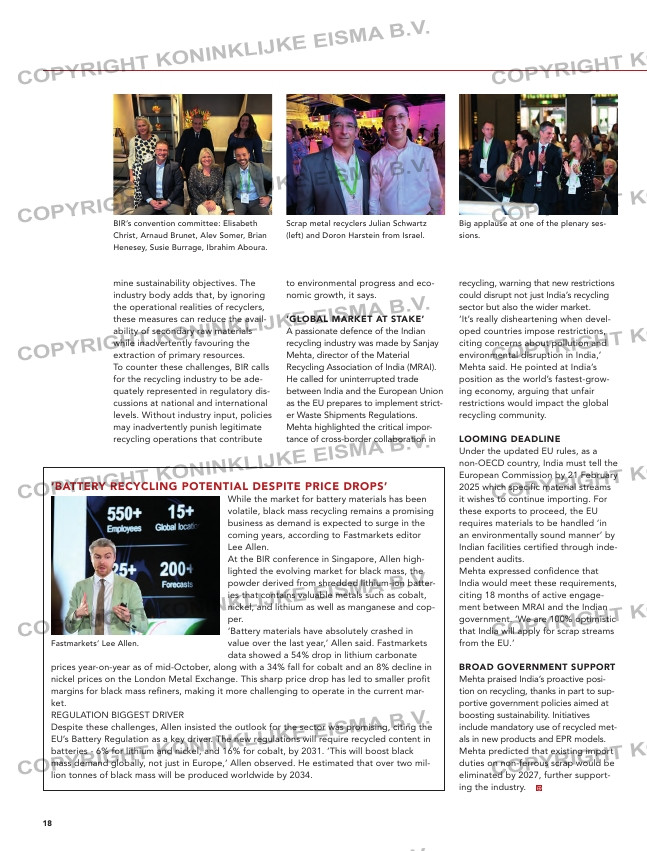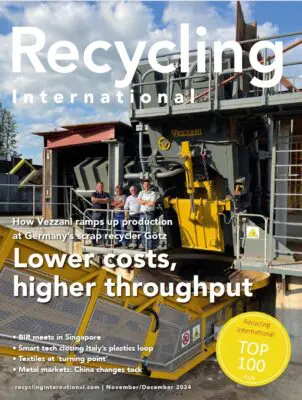Page 18 from: Recycling International November/December issue 2024

18
mine sustainability objectives. The
industry body adds that, by ignoring
the operational realities of recyclers,
these measures can reduce the avail-
ability of secondary raw materials
while inadvertently favouring the
extraction of primary resources.
To counter these challenges, BIR calls
for the recycling industry to be ade-
quately represented in regulatory dis-
cussions at national and international
levels. Without industry input, policies
may inadvertently punish legitimate
recycling operations that contribute
to environmental progress and eco-
nomic growth, it says.
‘GLOBAL MARKET AT STAKE’
A passionate defence of the Indian
recycling industry was made by Sanjay
Mehta, director of the Material
Recycling Association of India (MRAI).
He called for uninterrupted trade
between India and the European Union
as the EU prepares to implement strict-
er Waste Shipments Regulations.
Mehta highlighted the critical impor-
tance of cross-border collaboration in
recycling, warning that new restrictions
could disrupt not just India’s recycling
sector but also the wider market.
‘It’s really disheartening when devel-
oped countries impose restrictions,
citing concerns about pollution and
environmental disruption in India,’
Mehta said. He pointed at India’s
position as the world’s fastest-grow-
ing economy, arguing that unfair
restrictions would impact the global
recycling community.
LOOMING DEADLINE
Under the updated EU rules, as a
non-OECD country, India must tell the
European Commission by 21 February
2025 which specific material streams
it wishes to continue importing. For
these exports to proceed, the EU
requires materials to be handled ‘in
an environmentally sound manner’ by
Indian facilities certified through inde-
pendent audits.
Mehta expressed confidence that
India would meet these requirements,
citing 18 months of active engage-
ment between MRAI and the Indian
government. ‘We are 100% optimistic
that India will apply for scrap streams
from the EU.’
BROAD GOVERNMENT SUPPORT
Mehta praised India’s proactive posi-
tion on recycling, thanks in part to sup-
portive government policies aimed at
boosting sustainability. Initiatives
include mandatory use of recycled met-
als in new products and EPR models.
Mehta predicted that existing import
duties on non-ferrous scrap would be
eliminated by 2027, further support-
ing the industry.
BIR’s convention committee: Elisabeth
Christ, Arnaud Brunet, Alev Somer, Brian
Henesey, Susie Burrage, Ibrahim Aboura.
Big applause at one of the plenary ses-
sions.
Scrap metal recyclers Julian Schwartz
(left) and Doron Harstein from Israel.
‘BATTERY RECYCLING POTENTIAL DESPITE PRICE DROPS’
While the market for battery materials has been
volatile, black mass recycling remains a promising
business as demand is expected to surge in the
coming years, according to Fastmarkets editor
Lee Allen.
At the BIR conference in Singapore, Allen high-
lighted the evolving market for black mass, the
powder derived from shredded lithium-ion batter-
ies that contains valuable metals such as cobalt,
nickel, and lithium as well as manganese and cop-
per.
‘Battery materials have absolutely crashed in
value over the last year,’ Allen said. Fastmarkets
data showed a 54% drop in lithium carbonate
prices year-on-year as of mid-October, along with a 34% fall for cobalt and an 8% decline in
nickel prices on the London Metal Exchange. This sharp price drop has led to smaller profit
margins for black mass refiners, making it more challenging to operate in the current mar-
ket.
REGULATION BIGGEST DRIVER
Despite these challenges, Allen insisted the outlook for the sector was promising, citing the
EU’s Battery Regulation as a key driver. The new regulations will require recycled content in
batteries – 6% for lithium and nickel, and 16% for cobalt, by 2031. ‘This will boost black
mass demand globally, not just in Europe,’ Allen observed. He estimated that over two mil-
lion tonnes of black mass will be produced worldwide by 2034.
Fastmarkets’ Lee Allen.
Delta Metal operates four facilities in
China capable of handling 420 000
tonnes of materials sourced from 44
countries. Since China has imposed
stricter import rules leading to more
paperwork and rising compliance
costs, the company had to look for
alternative ways to secure their busi-
ness growth.
‘We had to look for opportunities
outside China,’ Delta Metal’s execu-
tive board member Anthony Wong
told the BIR convention, highlighting
benefits such as access to new mar-
kets, supply chain optimisation and
cost efficiencies.
Delta is currently expanding to
Thailand, where it has partnered with
Chinese electric vehicle giant BYD to
support its growing offshore produc-
tion. ‘Taking the first-mover advan-
tage to Thailand allows us to stay
competitive by reducing costs and
positioning strategically in the
region,’ Wong said.
BE PREPARED
Wong acknowledged the significant
barriers of establishing operations
abroad, including navigating unfamiliar
languages, culture, and regulations.
‘Walk in there like an idiot, and you
will get killed in no time,’ he joked.
Key lessons, he said, include conduct-
ing thorough feasibility studies and
maintaining agility with contingency
plans to address political instability or
sudden regulatory shifts. He also
stressed the importance of local part-
A U T H O R Martijn Reintjes
14-15-16-17-18-19_birsingapore2024.indd 18 19-11-2024 11:53



